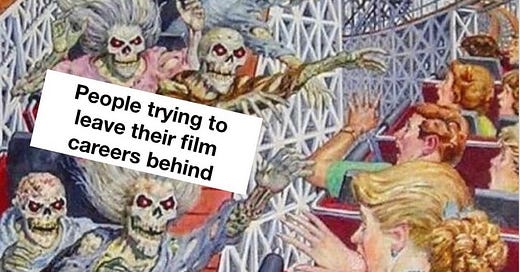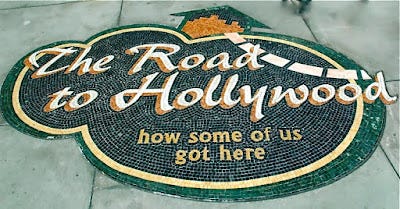Image courtesy of Crew Stories
Given the current state of Hollywood — uncertainty that stretches as far as this eye can see — I wouldn’t urge any young person to embark on a traditional film industry career these days. When, with no experience and a little help from her friends, a newspaper reporter can harness the power of AI to make a simple but visually competent film, the writing on the walls (read: the spray-paint tag on the big “H” of the Hollywood sign) is visible all the way from here on my Home Planet. The talent guilds and trade unions will fight, but it’s unlikely that anything can stop the coming tsunami of AI-driven change, which seems destined to inflict catastrophic collateral damage upon the tens of thousands of people who’ve been the backbone of the industry for the past hundred years. I don’t see it all going away — given that our collective future will be overflowing with increasingly catastrophic news, ENG crews will be very busy — but big change is coming, and it’s going to hurt.
Although the plot, character, and story details for any show still have to come from human brains — for the moment, anyway — it won’t be long before a complete feature film emerges straight from AI with no need for cameras, sets, lighting, or a crew of toolbelt-wearing technicians. Whether the public will embrace that kind of film remains to be seen, but as the technology improves and more AI “product” appears on our screens, a new generation of viewers will grow up accepting AI-generated visual aesthetics as normal — and as usual, economics will settle the issue. If and when AI capability and content becomes good enough and cheap enough, it will dominate. New post-production jobs will doubtless be created for a while, but eventually many of those will disappear as AI assumes more of the tasks humans used to do.
Beyond that, imagine a world where virtually everything we see on television is generated by AI, including newscasts where AI characters, carefully molded to appeal to and reassure viewers, report “news” that’s been shaped to further the goals of whoever holds the reins of power. At a certain point, most “news” will be fake, and we’ll be in our own version of Orwell’s “1984.”
Will this dystopia come to pass? I don’t know, but given the state of the world these days — a major war in Europe, yet another in the Middle East, trouble brewing in Asia, and political assassinations here in the US — apocalyptic scenarios spring to mind all too easily … in any event, that’ll be then and this is now, and it’s unlikely that any amount of finger wagging from some wheezing old geezer will dissuade young people from pursuing a film industry career. Maybe AI will find its niche without crashing through Hollywood (and beyond) like Godzilla, leaving some of the Old Ways for actual humans, so on that quasi-hopeful/wishful-thinking note, here’s another from the Wayback Machine, reworked for the present day.
*************************************************
***************************************************
For anyone contemplating a Hollywood career — whether your goal is to become a grip, actor, producer, or director — a basic reality holds: either you're born into the business or you're not. Although the doors open more readily for those with familial bonds, this is no guarantee of success: they still have to learn the job and be good at it, or else someone with more fire in the belly will take their place. That said, most who grow up in the industry are unencumbered by gauzy visions of a glamorous life in the Dream Factory — they already know about the long hours on set, unpredictable work schedules, and regular bouts of unemployment that can put real strains on relationships and family life. For these fortunate sons and daughters, the film industry is a family business, which renders them less likely to crash and burn than some kid from Palookaville lured to Hollywood with stars in his/her eyes. Jeff and Beau Bridges, Laura Dern, Kate Hudson, Peter, Jane, and Bridgett Fonda, Jamie Lee Curtis, Carrie Fisher, Wyatt Russell, and Dakota Johnson are just a few of the many successful actors who made the most of their insider status. It’s not that it was easy for them to succeed — it’s never easy — but being raised in an industry family gave them a definite edge.
This holds true below-the-line as well, where several family dynasties are represented among grip, electric, camera, and the ranks of production. These people — solid pros who aren't phased by anything the job might throw at them on set — form the backbone of the Hollywood industry. Although few of them can (or would) bore you to tears spouting film theory or prattling on about the role of montage and the cinematic resonance of the seminal Odessa Steps sequence in Eisenstein's Battleship Potemkin,* many of their fathers, mothers, uncles, and/or grandfathers worked on some of Hollywood's most cherished classics. They might not have a film school degree, but their roots go deep in the aquifer of LA's signature industry.
Example: the father of a Best Boy I worked with for many years down the final stretch of my career was an assistant cameraman for DP John Alonzo on Chinatown — and in my world, that’s cinematic royalty.
It's different for those of us who came from the outside. Although I’ve worked with crew people who graduated from high-profile film schools like USC, UCLA, NYU, and the AFI — where young people with sufficient talent, ambition, and drive make industry and peer-group connections to help launch their future careers — most outsiders come to Hollywood on the proverbial wing and a prayer. My school didn’t even have a theater arts major, much less a film program, so although I was exposed to a multitude of great films, nothing in school prepared me to carve out a career in Hollywood. With the internet fifteen years in the future and no industry blogs or websites to light the path, I had no idea where the doors to the industry were, much less how to kick them open.
That's where you need a little help from your friends. Without a boost from somebody at the right time (ahem: thanks, Tim!), I might have had to slink back home with my tail between my legs after six months … but I did get a little help — a tip here, a recommendation there, a call from out of the blue — when that’s exactly what I needed to gain some traction in a very slippery free-lance world. I still had to work my ass off to earn the respect of my peers doing low-budget features, all-night shoots in the snow and rain, running (and worse, wrapping…) cable in downtown LA's infamous "Shitter's Alley," and toiling long days in the brutal sun of Death Valley, but that’s how you pay your dues on the path to becoming a working pro in the industry. By then, it doesn’t matter if you were born into the biz or crashed the party from elsewhere: you’ve earned your spurs and proved you belong.
It’s nearly fifty years since I landed in Hollywood, a period during which the industry has undergone radical changes. The old ways and institutions are crumbling fast — it takes more than a strong back and the willingness to work hard to succeed nowadays — but if the Digital Revolution rendered much of what I know obsolete, it offers new opportunity for young people with the aptitude, ambition, and resilience to make the most of this new reality. Although there will always be insiders with a built-in edge, an era of revolutionary change is fertile ground for young, hard-charging outsiders, and despite the challenges facing the industry these days — which are more daunting than anything I saw during my forty years of toiling below decks — I’m sure many will find their way inside the gates of Hollywood … or wherever movies are made in the future.
An old cliché applies here: “If there’s anything else you can do in life, do it” — in other words, don’t tilt at the windmills of the film industry if you have any other viable options — but if this is what you really want, then go for it. It’s your life, so follow your own North Star. A new establishment will emerge from the digital ether at some point, where you might find your niche. As Nobel prize-winning biochemist Kati Karikó likes to say:
“If you want to do something, you find a way. And if you don’t, then you find excuses.”
Just be ready to bust your ass, because some things never change.
* Don't ask me — I'm just a broken-down ex-juicer who didn't go to a real film school.






I wonder if Gen Z feels about Hollywood the way we old fogies do? Do they resonate with the glamorous (!) history or do they have a different focus? I think AI will relegate Hollywood and all it stood for, (the fan magazines: Photoplay, Screenland, Grauman's Chinese Theatre...) to the background and maybe the up and comers won't care. Just sayin' 🤷♀️
Well done, Mike! On the money. Monty.
Agreed. Pamela.
We came out along with 15 other Austin filmmakers in the 'Great Migration of '76'. You know most of them. We worked in the biz for decades, and some of us are still here and still working in the ever-changing world of Hollywood.